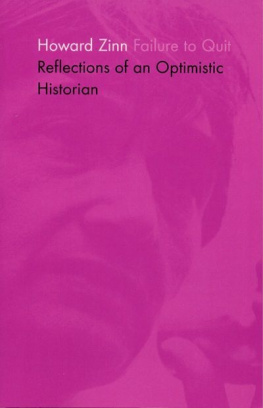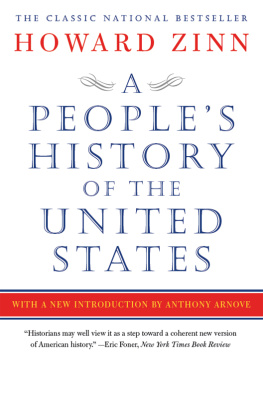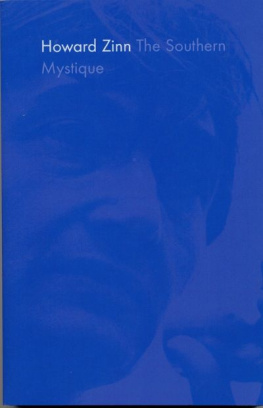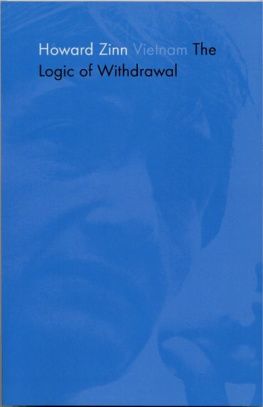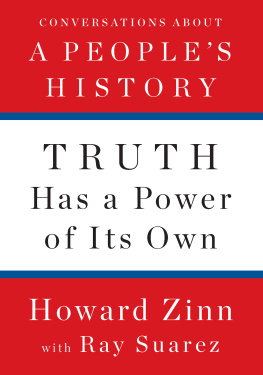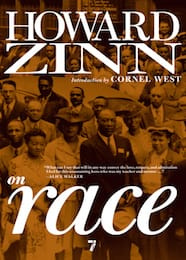
FAILURE TO QUIT
Reflections of an Optimistic Historian
Howard Zinn
Copyright 1993 and 2002 by Howard Zinn.
Perils of Plato, Je Ne Suis Pas un Marxiste (originally published as Nothing Human is Alien to Me), Objections to Objectivity, The Optimism of Uncertainty, and Failure to Quit have appeared in Z Magazine; The Supreme Court is Not Supreme appeared in Civil Liberties Review; The Problem is Civil Obedience appeared in Violence: The Crisis of American Confidence (Johns Hopkins Press, 1972); How Free is Higher Education? appeared in the Gannett Center Journal; Columbus, the Indians, and Human Progress appeared as an Open Magazine pamphlet.
Any properly footnoted quotation of up to 500 sequential words may be used without permission, as long as the total number of words quoted does not exceed 2,000.
To Staughton and Alice Lynd,
who refuse to quit.
Contents
In 1986, President Ronald Reagan, in his continuing effortsboth legal and illegalto overthrow the revolutionary Sandinista government in Nicaragua, declared a blockade of that small Central American country. Tens of thousands of Americans had signed a Pledge of Resistance to commit civil disobedience if warlike measures were undertaken against the Sandinistas. In Boston, five hundred and fifty people, I among them, occupied the federal building downtown, and refused to leave. We were all arrested, held for a while, then released. It proved too big a job, perhaps too embarrassing an undertaking, to prosecute so many, and the charges were dropped. I received notice of that, and for the first time learned what we were all being charge with: Failure to quit the premisesan old Massachusetts statute to deal with trespassing. I thought that phrase failure to quit perfecdy epitomized the determination of people all over the country to protest government actions they saw as violations of human rights, whether here or abroad. So when Common Courage Press put together a group of my essays on various subjects, we decided to call the book Failure to Quit.
Introducing a bunch of writings (the word anthology, originally meaning a collection of flowers, would be going too far) requires a certain amount of ingenuity, finding a common thread in pieces that were written at different times, in response to different situations.
The difficulty is compounded in this case, where some of the pieces are transcripts of talks: ranging from a Vietnam-era debate at Johns Hopkins University to more recent lectures at the University of Wisconsin and the University of Minnesota, a talk for the Civil Liberties Union of Massachusetts, and a lecture at the Wellfleet Public Library broadcast on WOMR, Cape Cod, organized by those super-organizers, Robert and Ethel Levy.
Others are essays, written for the now-defunct (am I responsible?) Civil Liberties Review, or the (also defunct; my record is getting worse by the minute) Gannett Center Journal. Five of the shorter pieces were written for Z Magazine. One was written for the Open Magazine Pamphlet Series.
One entry is an unpublished Op-Ed piece. And one is an interview with the extraordinary radio persona David Barsamian.
The closest I can come to finding a common thread is that all the pieces represent the thinking of someone who wants to address urgent issues of peace and justice with the perspective (presumably long-range and very wise) of a historian.
The stimulus for putting these together came from Greg Bates, who claims to run Common Courage Press from someplace in Maine, but I have never laid eyes on him or his locus of operations in Maine, so I am only assuming they exist. All I can say is that he is very engaging on the telephone, good-humored, easy to work with. Add those qualities to invisibility and you have the perfect editor-publisher. The question now is whether we have matched such a publisher with a proper writer. I leave that judgment to the reader.
Howard Zinn
March 1993
Who Controls the Past
Controls the Future
This interview took place in Boulder, Colorado in 1992, and David Barsamian and I had a lot of fun with it, which is hard to recapture in a transcript, so readers will have to content themselves with what is left after the tape was scrupulously edited to remove the fun. I met David some years ago when I was invited to speak in Boulder by a remarkable veteran journalist named Sender Garlin, now ninety and brimming with energy. David has been a pioneer in what is mysteriously called alternative radio, and when I spoke a few years ago to a national conference of several hundred alternative radio people, everyone seemed to know him. He drew from me things about my life which I was saving for my own slightly shorter version of Remembrance of Things Past.
1992
Barsamian:I want to know something about your roots, growing up in the projects on the lower East Side.
I grew up in the slums of Brooklyn. Not projects. They werent advanced enough to have projects. I think maybe the first New Deal housing project was in Williamsburg, Brooklyn. But that was too good for us. I grew up in the slums of Brooklyn, a working class family. My parents were European immigrants, factory workers in New York. They met as factory workers. They were Jewish immigrants. My father came from Austria, my mother from Asiatic Russia, Siberia. I remember moving all the time. We were always one step ahead of the landlord. And changing schools all the time. My father struggled, went from job to job, he was unemployed and under WPA. I wanted to get out of the house all the time. Where we lived was never a nice place to be. So I was in the streets a lot. I understand what its like for kids to live in and prefer the streets. Thats how I grew up.
When I got to be college age I went to work in a shipyard and became a shipyard worker for three years. My family needed the money. The East Side came later, after the war. I volunteered for the Air Force and was a bombardier. I got married before I went overseas. After the war my wife and I first lived in Bedford-Stuyvesant in a rat-infested basement. Im building up my sordid past, trying to evoke tears. We were so happy when we were accepted into the Lillian Wald housing project, a low-income housing project on the East Side of New York. We lived there for seven years while I went to New York University under the GI Bill and to graduate school at Columbia. My wife worked. Our two kids were in nursery school.
Barsamian:What was the language at home? Did you speak Yiddish?
Not me. My parents spoke Yiddish to each other, so I understood it. When they spoke to us they spoke English, nicely accented, with a few Yiddish words thrown in. I never actually used Yiddish, but I still can understand it. Words like bagel and knish.
Barsamian:I remember you telling me about your father being a waiter for many years. Hed work a bar mitzvah and then thered be no work, and then hed do a bat mitzvah.
He did a lot of Jewish weddings. In fact, when I was about seventeen he introduced me to it. On New Years Eve they would be short and the waiters would be able to bring their sons in. They called them juniors. It was an AFL craft union. Everything was hereditary: the leadership of the union, the jobs, etc. I really hated being a waiter, and I felt for my father. They used to call him Charlie Chaplin because he walked like Charlie Chaplin. His feet were flat. They said it was the result of all those years of being a waiter. I dont know if thats true or not, but that was the story. He worked very hard. He was a great fan of Roosevelt during the New Deal, he and a lot of other people who didnt have any jobs any more. People were still getting married, but they werent paying waiters, so my father worked as a ditch digger with the WPA. My mother had been a factory worker before she was married. When she got married she began having kids, and it was my fathers job to support the family.

